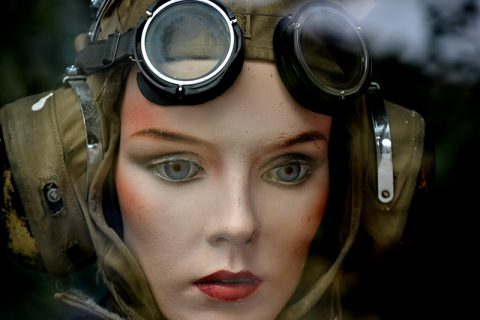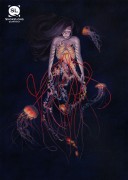Much of what I love about this story lies in its narrative innovation. In parts of this story, we zoom in, along with our third-person narrator, to be quite close to the seed traveling in Ivan Ivanovich’s pant-leg. What exercises prepared you for writing in the POV of a grass seed? Did you do a lot of research for this (i.e. talking to grass, visiting botanical gardens, etc.)?
In my writing, I often try to explore points of view that I am not entirely comfortable with. I’m allergic to grass, so I tried to get deep into the mind of my enemy: to get to the heart of what motivates it, to find what floats its seedy little boat. Grass is everywhere, so it was easy to interview, and I gained new respect for its simple psyche. It does what it needs to do to survive. I think at a base level that is what motivates us all. Grass is honest. But itchy.
Breaking news: As I write this, a country town in Australia (Wangaratta) is under siege from tumbleweeds also known as “hairy panic grass.” These wispy grass seed gangs clump together and roll into towns creating havoc. Up to two meters high, they cover cars and roads, and block old people in their houses. I kid you not. Grass is devious.
To expand on the previous question, can you explain, in intricate detail, what it looks like when our heroic grass seed “precariously grabbed onto the possibility of [Ivan’s] pants”?
The seed finds itself perched precariously on a pebble. As Ivan passes, his floppy old pants create a micro gust, which catches one of the seed’s cleverly evolved features, a wing-like sheath, lifting it into the backdraft of the pants. This seed is a young Oliver Twist type, a naive opportunist with hope in its heart. Not a deep thinker, when it feels the lift, it throws itself, and caution, to the wind. One of the tiny barbs along the outer edge of its sheath, another of its smart features, snags a thread on the pants. The connection, while precarious, is undeniable. (I like the word precarious.)
Another narrative element of this story lies in its metafictional asides. Aside from drawing attention to the art of the story itself, this element, in a way, likens our heroic grass seed to a story, in the way it is carried almost inherently and the way it takes root and spreads. Why did you choose to employ these elements of metafiction in this story? Is it a common element in your fiction?
For me, story is such a big part of how we think, how we make sense of the world and our place in it. It is the basis for the lives we live. I see story construction everywhere, especially in the stories we tell ourselves about stories. I can’t help but look at the strings moving the puppet, so I tend to see almost all fiction as metafiction. Sometimes I draw attention to the strings, if it helps the voice of the story. At other times, I just like to write about the puppets, and pretend the strings aren’t there.
I can see this story working as a metaphor for a lot of diseases: the black plague, smallpox, ebola, and the Internet. Did you have a specific sickness in mind while writing this story? If not, which sickness might you liken a grass seed to and why?
Being Australian, I suppose I saw the grass more as a colonial invader, taking over indigenous species, changing the landscape. I can see how it could be interpreted as a disease. I like that idea. There is a computer game, where you chose a pandemic and you earn points for the numbers of people it kills. You can buy mutating traits, to make your disease more impervious to human intervention, and you win the game if you wipe out the human race before they can find a cure. It’s not very cheerful. Humans might be like that. We are wiping ourselves out; we just don’t see it yet.
I combed the shallow recesses of my mind and couldn’t settle on the Russian author you’re referencing in the last line of the story. Did you have a specific author in mind?
I had an amalgam of multiple Russian authors in mind—like a Dostchekgolokov.
Do you garden?
I subscribe to the Darwinian school of gardening, where only the fittest survive. I plant them, water them for a week and then they’re on their own. I also have a “live and let live” policy for pests and diseases. Surprisingly, my garden does quite well.



 The core workshop of SmokeLong Fitness is all in writing, so you can take part from anywhere at anytime. We are excited about creating a supportive, consistent and structured environment for flash writers to work on their craft in a community. We are thrilled and proud to say that our workshop participants have won, placed, or been listed in every major flash competition. Community works.
The core workshop of SmokeLong Fitness is all in writing, so you can take part from anywhere at anytime. We are excited about creating a supportive, consistent and structured environment for flash writers to work on their craft in a community. We are thrilled and proud to say that our workshop participants have won, placed, or been listed in every major flash competition. Community works.